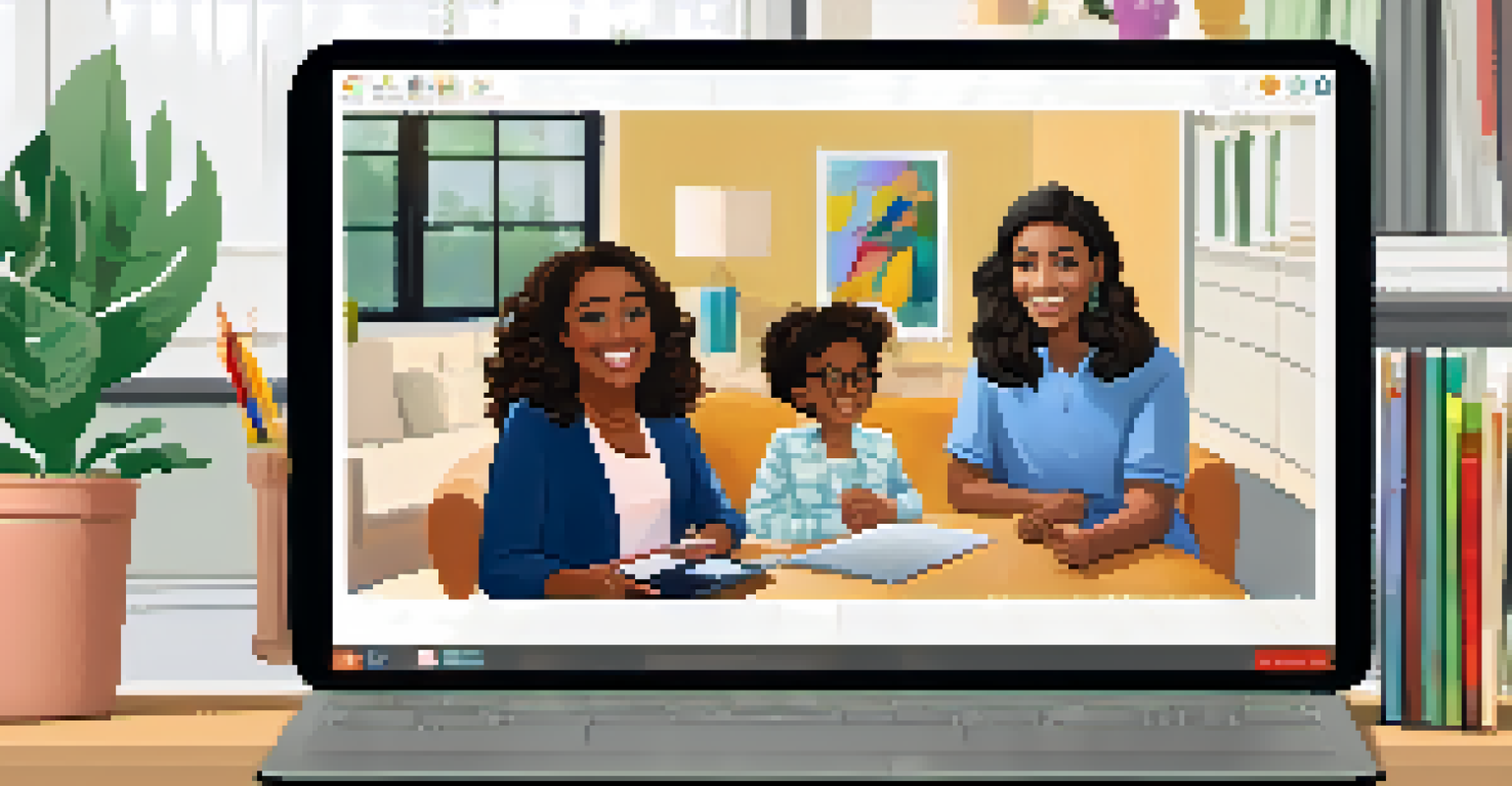Parent-Teacher Communication in Online Learning Environments

The Importance of Communication in Online Learning
In the world of online learning, effective communication between parents and teachers is crucial. This collaboration helps ensure that students are supported both academically and emotionally. It also fosters a sense of community, even in a virtual environment, which can be particularly beneficial for students who may feel isolated.
The single biggest problem in communication is the illusion that it has taken place.
When parents and teachers communicate regularly, they can share insights about the child's progress and any challenges they may face. This two-way dialogue allows for timely interventions and tailored support that can make a significant difference in a student's learning journey. Moreover, it empowers parents to be more involved in their child's education.
Ultimately, strong communication creates a partnership that reinforces the value of education. By working together, parents and teachers can cultivate an environment that not only promotes academic success but also nurtures the child's overall well-being.
Choosing the Right Communication Tools
In today’s digital age, there are numerous tools available for effective communication between parents and teachers. Platforms like email, messaging apps, and dedicated school portals can facilitate easy and consistent interactions. Each tool has its unique strengths, so selecting the right one for your school community is essential.

For instance, messaging apps can offer real-time communication, while email may be more suitable for detailed updates and formal correspondence. It's important to consider the preferences of both parents and teachers when establishing these communication channels. Creating a shared understanding of how and when to communicate can lead to smoother interactions.
Effective Communication is Key
Strong communication between parents and teachers fosters academic support and emotional well-being for students.
Additionally, schools might consider using online forums or social media groups to foster a sense of community. By choosing the right mix of tools, everyone involved can stay informed and engaged, enhancing the overall online learning experience.
Establishing Clear Communication Guidelines
To maximize the effectiveness of communication, it's vital to establish clear guidelines that outline expectations and protocols. These guidelines can help set boundaries around response times, preferred communication methods, and the types of information to be shared. Clarity in communication can prevent misunderstandings and ensure that everyone is on the same page.
Communication works for those who work at it.
For example, parents should know when they can expect responses from teachers, while teachers can benefit from knowing the best times to reach out to parents. By setting these parameters, both parties can communicate more effectively and confidently, reducing the chances of frustration or miscommunication.
Moreover, clear guidelines can also help streamline communication, making it easier for busy parents and teachers to manage their time. This structure ultimately supports a more organized approach to collaboration in the online learning environment.
Encouraging Open and Honest Feedback
Feedback is a crucial component of effective communication, especially in an online learning environment. Encouraging open and honest feedback allows parents and teachers to express their thoughts and concerns freely. This transparency builds trust and fosters a supportive atmosphere for everyone involved.
For instance, teachers can regularly solicit feedback from parents regarding their child's learning experience. Likewise, parents should feel empowered to share their observations and suggestions. This reciprocal feedback loop can lead to valuable insights that help enhance the educational experience for students.
Choose the Right Tools Wisely
Selecting appropriate communication tools, like messaging apps or school portals, enhances engagement and interaction among parents and teachers.
Creating a culture of feedback can also lead to continuous improvement. When both parents and teachers are willing to engage in constructive conversations, they can collaboratively identify areas for growth and implement strategies that benefit the students.
Utilizing Regular Updates and Progress Reports
Regular updates and progress reports can play a vital role in keeping parents informed about their child's academic journey. These updates can include information on assignments, assessments, and any noteworthy achievements. By providing consistent information, teachers can help parents stay engaged and supportive.
For example, a weekly newsletter can serve as an effective way to communicate key developments in the classroom. This might include upcoming projects, important deadlines, and reminders about parent-teacher meetings. Such proactive communication helps parents feel more connected to their child's education.
Moreover, progress reports that highlight a student's strengths and areas for improvement can prompt meaningful discussions between parents and teachers. By sharing this information, both parties can collaborate on strategies to support the student’s learning goals.
Creating a Supportive Online Community
Building a supportive online community is essential for enhancing parent-teacher communication. When parents, teachers, and students feel connected, it creates a more positive and enriching learning environment. Social media groups, online forums, or virtual meet-ups can help foster this sense of community.
These platforms allow parents to share experiences, ask questions, and offer support to one another. Teachers can also participate in these discussions, providing valuable insights and resources that benefit the entire community. This collaborative spirit can lead to a more engaged and informed group.
Encourage Feedback for Improvement
Open and honest feedback between parents and teachers creates trust and drives continuous improvement in the online learning experience.
Ultimately, a strong online community can enhance the educational experience for students. When parents and teachers work together in a supportive atmosphere, it promotes a holistic approach to learning and development.
Overcoming Challenges in Communication
Despite the best intentions, challenges in communication can still arise in online learning environments. Issues such as time zone differences, technology glitches, or varying communication styles can make it difficult for parents and teachers to connect. Recognizing these potential challenges is the first step toward overcoming them.
For example, scheduling regular meetings at flexible times can accommodate different schedules and time zones. Additionally, providing training on communication tools can help ensure that everyone is comfortable using them. By addressing these challenges head-on, schools can create a more conducive environment for effective communication.

Moreover, remaining patient and understanding during these challenges is essential. By fostering a culture of empathy and support, both parents and teachers can work together to navigate any obstacles that may arise in the online learning landscape.